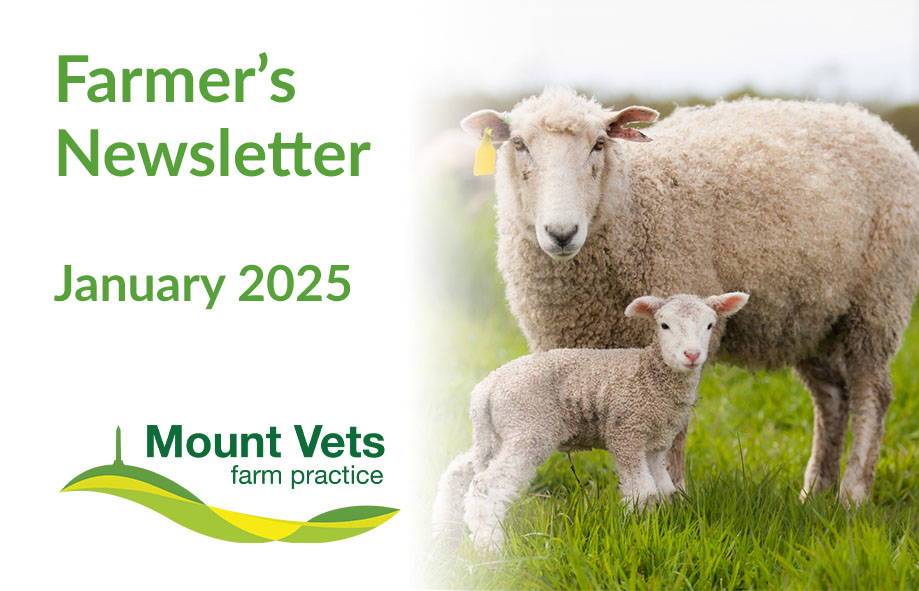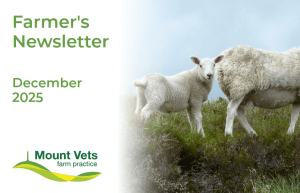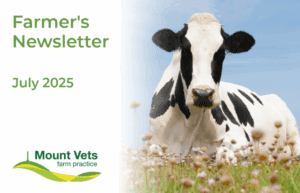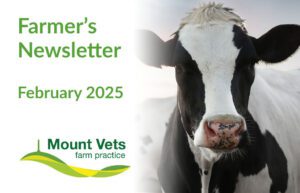January 2025
Here is the latest from our farm team at Mount Vets. If you would like any further advice or would like us to cover something in the next newsletter, please call us on 01823 662286 or contact us here.
We want to hear your feedback… Leave us a review!
We value your feedback and comments and would appreciate if you could take the time to leave us a review! Please follow the link to share your thoughts.
Just a quick reminder to call in as soon as you get your letter from APHA to notify you that your TB test is due. We are approaching a very busy time of year and would appreciate your help with booking your TB tests early.
Many thanks from Mount Vets Farm Reception team.
Twin Lamb
(Written by Pippa White)
Otherwise known as pregnancy toxaemia, twin lamb disease is a metabolic condition that hits ewes during the last couple weeks in the run up to lambing. It can be preceded by any stressful event which affects the opportunity to eat e.g. group changes or poor weather. They present as:
- Weak or down
- Some are blind
- Grinding of teeth
- Hyperresponsive to touch
70% of lamb growth occurs in the last 8 weeks of pregnancy. As the lambs grow inside the ewe, there is less space in her abdomen for her rumen to fill. As a result, she will have decreased appetite, leading to lower protein and energy intake. This leads her to be short on glucose(energy). She will start to use her own body fat reserves to compensate, resulting in weight loss and the release of ketones (a by-product of fat breakdown). These ketones are where the term ‘toxaemia’ comes from, as ketones in high amounts are harmful to normal body function.
Prevention is always better than cure, there are several considerations in the run up to lambing that should be made:
- Scanning can help you to tailor the diet to the number of lambs each ewe is carrying, as this varies greatly depending on numbers of lambs.
- Ensure there is a minimum of 45cm per ewe for concentrates, and 12-15cm per ewe for forage.
- Maintain appropriate body condition score at 8 weeks pre-lambing and throughout pregnancy (aim for score 2.5-3).
- Maintain diet quality, poor feed will only take up vital room in the rumen!
- Blood samples can be taken 3-4 weeks prior to lambing start date to assess how well a diet is functioning, this give chance for remedial changes should they be required.
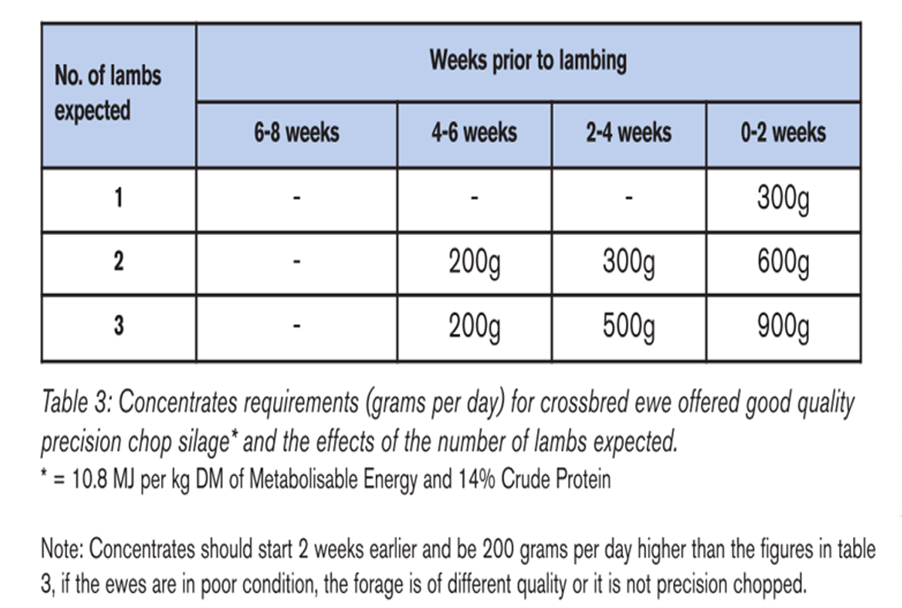
Recovery is varied, with some reports of only 30% pulling through, so again prevention is key. However, to treat this condition, a varied approach is taken:
Isolation – so you can monitor intakes and no other ewes steal her palatable food she should be offered.
Oral energy drench – to fulfil the energy requirements whilst her appetite regains.
Pain relief – to reduce the inflammatory response associated with twin lamb, it will also make the ewe more comfortable as it is a painful condition.
Calcium – many cases also have an underlying calcium deficiency, and supplementing this will help with energy metabolism.
Vitamin B12 – this is essential for the energy production cycle within cells.
Caesarean/induction – this is last resort, if ewes are unresponsive to treatment, as a salvage procedure to save the ewe.
If you wish discuss any cases or prevention further, please do get in contact: 01823 662286
Problematic prolapses
(Written by Pippa White)
Spring is around the corner – although hard to believe as I write this in January drizzle. With this brings the highs and lows of lambing. It’s not just the actual birth that we get called out to. One such condition is a vaginal prolapse. Whilst reportedly only affecting 1% of ewes, this can range massively from 0% up to 15%.
What causes them?
Many different reasons have been given, most are easily attributed; of being over conditioned, multiple foetuses, coughing and subclinical hypocalcaemia. An unusual is short tail dock (when the tail is too short to cover the entire vulva length). It is thought a dock too tight interferes with muscles and nerves associated with the pelvic floor. Something to bear in mind when docking lambs this year? These factors should be evaluated if prolapses are a frequent issue within your flock.
What are the signs?
Aside from the obvious clinical sign of something sticking out the back end that shouldn’t be, ewes will often look very much like they are in labour. The discomfort arises from both the prolapse and inability to pass urine – the urethra is kinked off by the prolapse meaning the bladder will not be able to empty.
How can we fix them?
Each case should receive a course of antibiotics to prevent an ascending infection through the cervix from jeopardising the pregnancy, and pain relief. There are multiple options for retaining the prolapse, each has their own benefits and disadvantages:
Prolapse spoon
- Easy to apply
- Ewes can lamb ‘over’ them
- Signs of birth starting are more obvious
- Sometimes dislodge repeatedly, requiring multiple prolapse replacements
- The vaginal surface can become ulcerated and sore if used for a prolonged period, leading to scarring and potential constriction of the birth canal
- The twine associated with the spoon can be hard to spot in the wool, making identification unless marked more difficult
Prolapse harness
- Similarly easy to apply like the spoon
- Identification of individuals is obvious
- For individuals with very forceful abdominal contractions, harnesses may not hold the prolapse back in and can be hard to get adequate tension on
- Pressure/contact sores can be caused if used for a prolonged period or if done up too tightly
Suture
- The vet applying the suture can check if lambing is imminent and for any other damage to the vagina
- The prolapse will not pass through the suture, but cleansing should be able to which helps indicate the start of birth
- Completed under an epidural, which is added pain relief and decreases the straining associated
- If the start of birth is missed, the lambs may die if the suture is not undone soon enough
- Some ewes will strain so forcefully that they tear the suture
- It adds to the vet bill!
Although not as dramatic as a uterine prolapse, these should still be taken seriously. Time is not on side and so the quicker, and cleaner the vaginal prolapse can be replaced is all the better for the ewe and potential lambs. Complications of prolapses includes vaginal tears, infection and even prolapse of intestines as the vaginal wall damage increases. We are always happy to talk over the phone on these cases, as you can see it’s not just one solution for everyone.
Bleeding Calf Disease
(Written by Amy Birch)
A 16-day-old Limousin cross heifer was examined for a two-day history of dull demeanour, high respiratory rate, and loss of interest in suckling from the dam, but drinking large volumes of water from the trough. Examination revealed a fever of 40°C, a high respiratory rate, and harsh lung sounds. Oral tissues objectively seemed more pale than usual, but the blood sample taken didn’t show anaemia (low red blood cells). Due to the high fever, harsh lung sounds, and overall dullness of the calf, anti-inflammatories and antibiotics were started for possible pneumonia.
The next day the calf was worse – very reluctant to stand, and another interesting sign was present. It appeared that blood was dripping from the calf’s eyes, but on closer inspection the source was from extremely tiny wounds on the skin. The same blood trail was present at the two injection sites from the day before, and from almost non-existent wounds all over the calf’s body (likely fly bites). To have such significant bleeds from these tiny wounds means there was an issue with the calf’s ability to form normal blood clots to patch up any damaged vessels. Failure of normal blood clotting is called ‘coagulopathy’. As the calf still had harsh lung sounds, it is likely that she was also bleeding into her chest. For welfare reasons, she was euthanized.
Our main suspicion for the inciting cause was a rare disease called bovine neonatal pancytopaenia (BNP) or ‘bleeding calf disease’. This was previously known to be caused when a calf would drink colostrum from a dam that was given a vaccine called Pregsure BVD. The antibodies in the colostrum would attack the bone marrow of the calf where important clotting factors are produced, meaning that is calf is susceptible to severe bleeds. However, this vaccine is no longer available, and yet there are still occasional reports of this disease occurring. Other possible causes are infection with BVD itself, or from antibodies in colostrum from other vaccines/medications the dam was given.
A postmortem was performed which revealed very pale muscle tissue and many small bleeds throughout the body. A sample was taken of the bone marrow for laboratory examination, and this confirmed our suspicion of damage to the bone marrow, which caused the clotting disorder. BVD testing was also performed, and this calf was both antibody and antigen negative, which rules out involvement of BVD. The dam had never been vaccinated with Pregsure BVD, so that isn’t implicated in this case. Interestingly, the dam did have redwater (a tick-borne disease) a couple of weeks before calving and was treated successfully with imidocarb. It’s possible antibodies in the colostrum were formed in response to the redwater parasite, or to the treatment administered. Unfortunately, it is unlikely that we will ever know the trigger in this particular case, but it is a very interesting disease and one which we hope we don’t see too often.
Upcoming courses
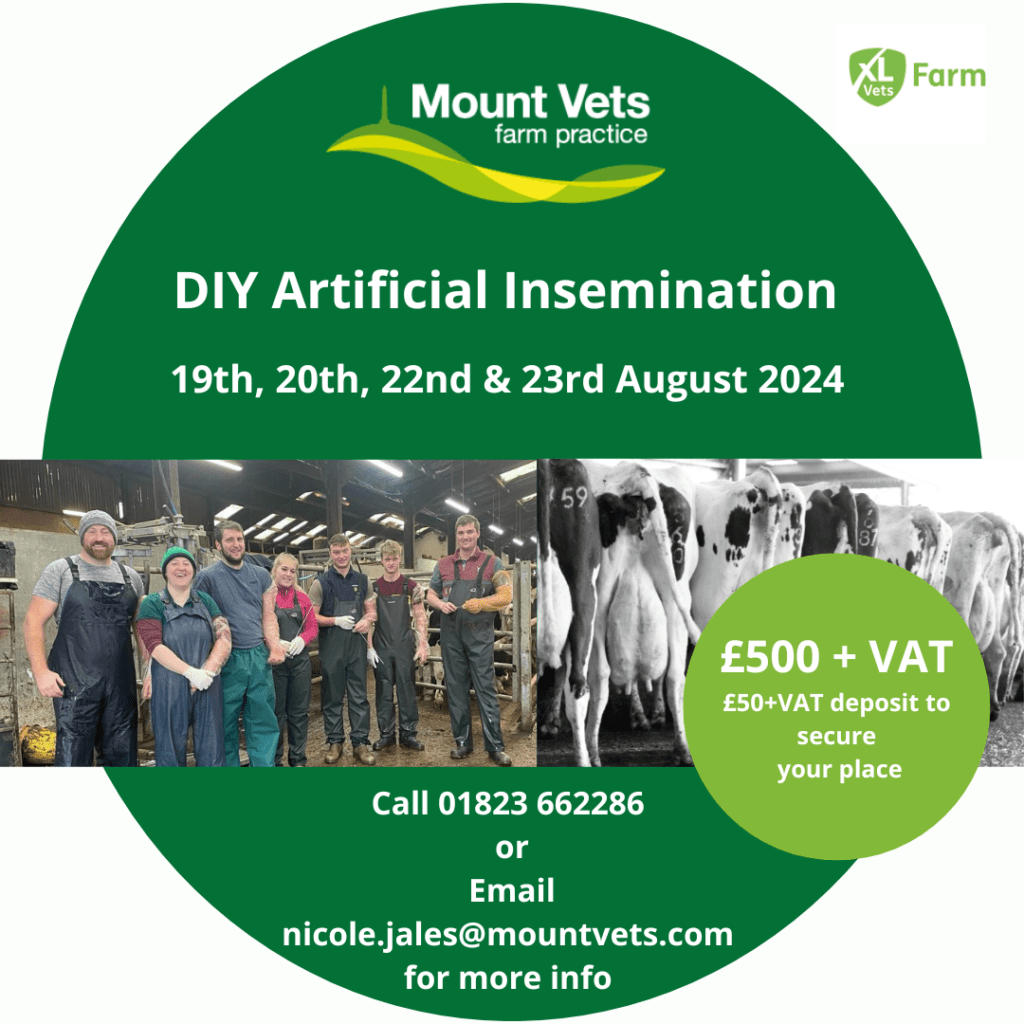
DIY Articial Insemiation Course
Our next 4-day DIY AI course will run on 19th, 20th, 22nd & 23rd August 2024.
This DEFRA approved course is aimed at anyone who has no previous experience in the artificial insemination of cows.
The 4-day course is run by our experienced farm vet Rob Mangham and is full of theory and practical sessions to make sure you leave feeling confident and safe in all aspects of AI.
The cost of the course is £500 + VAT, with a £50+VAT deposit to secure your space.
(Deposit will be taken off final amount)
Please ring the practice to book your place on any of our courses on 01823 662286 or email farm@mountvets.com
Meet the Team!
We have an experienced & friendly team here at Mount Vets. You might already recognise a few faces but over the next few months we will reintroduce you to some of our excellent team. To read more and see more of the faces of Mount Vets visit our team page, and be sure to follow us on Instagram and Facebook.
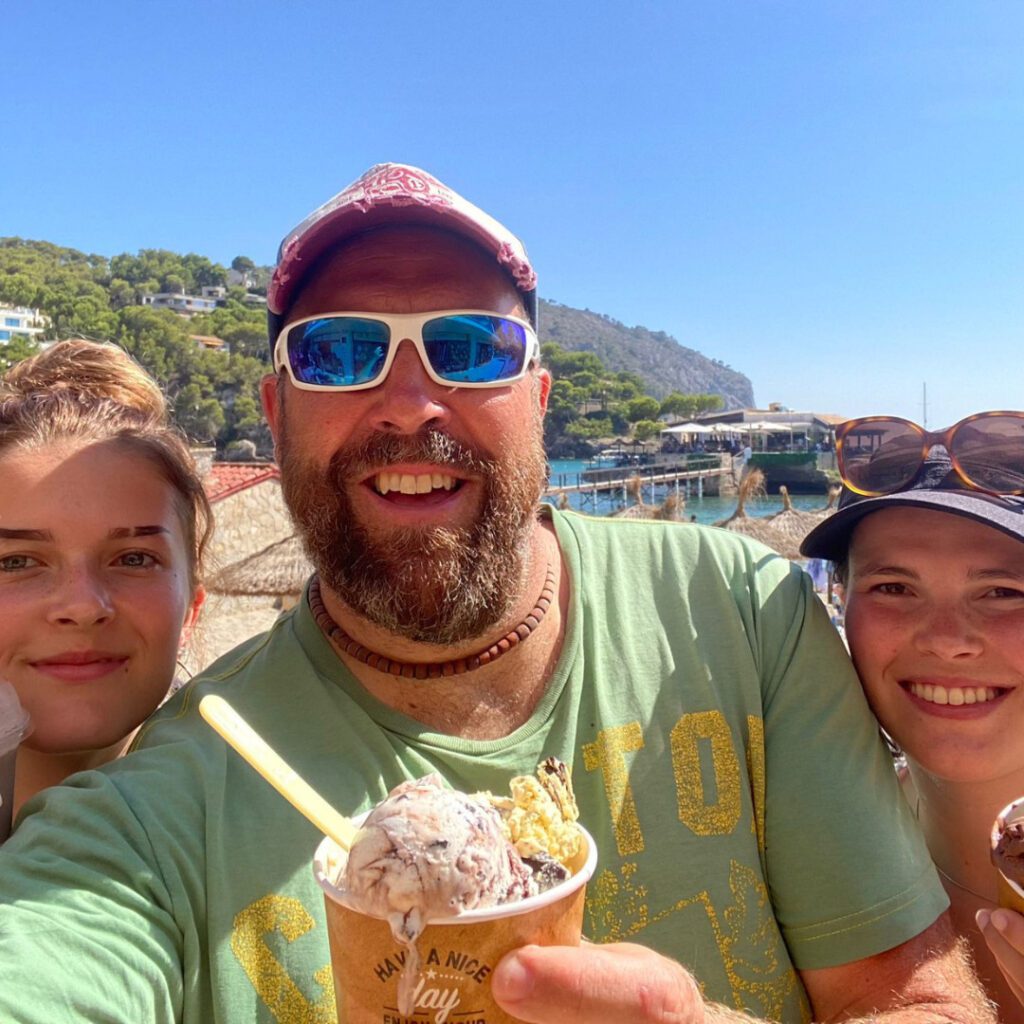
Piers Pepperell
Director
Many of you will already know our Mount Vets Director Piers; but did you know he has appeared on tv show Blind Date with Cilla Black?
Piers loves to spend a free day with his two daughters and three dogs, surfing on the North Devon Coast.
His favourite vet call out was when he was called into the waiting room and unknown to him at the time, but he then met his wife to be. She had brought in her eight baby bunny rabbits, which led on naturally to a 10-minute chat about pig wormers and her asking Piers out on a date.
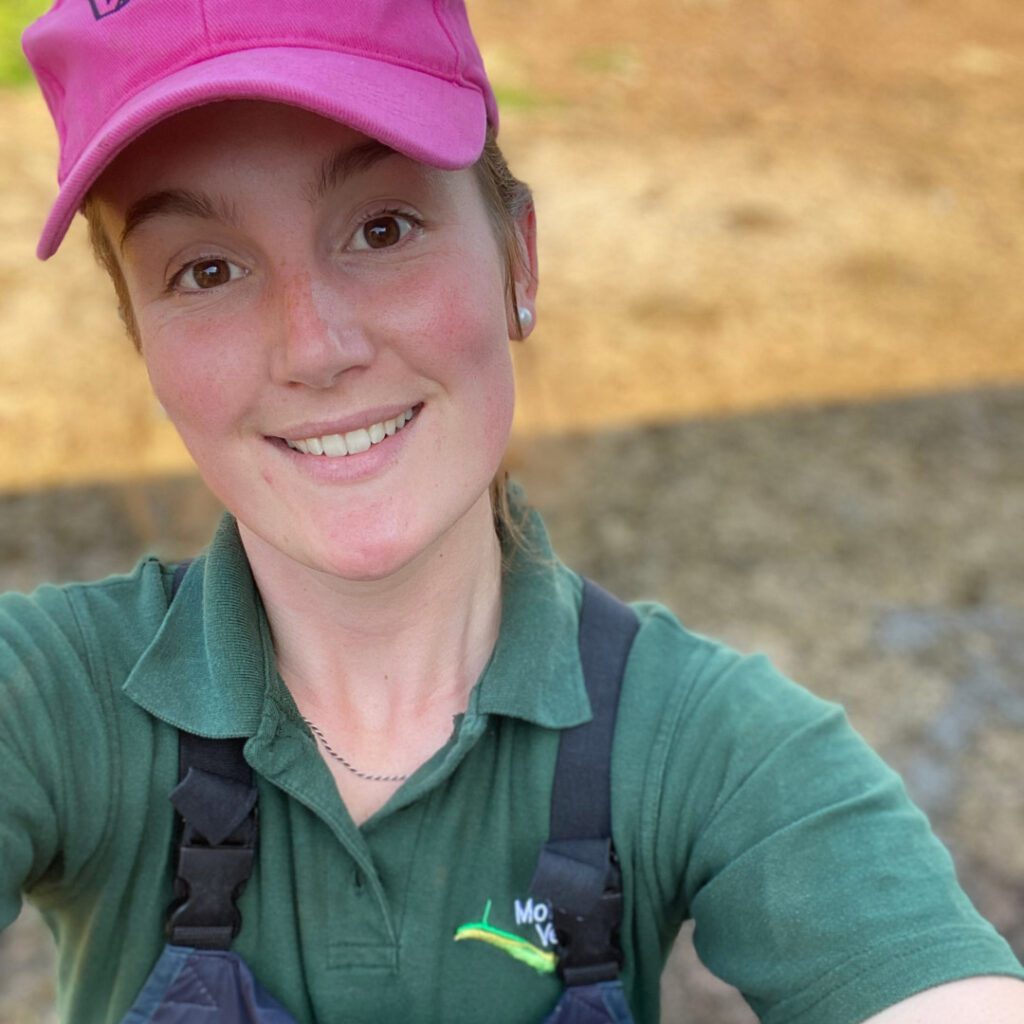
Pip White
Vet
Pip is one of our large animal vets. If you’ve met her, you will probably know how much she loves her cows. So much so, that she loves to spend her free time at home with her cows! That, or in the showring showing them. 🐮
Pip graduated as top student in her year from the University of Surrey.
Her favourite song is Mr Brightside by the Killers.
Have a question about any of the topics covered in this newsletter?
If you need any assistance with the topics covered in this newsletter, please do not hesitate to get in touch with our experienced farm vets who will be able to help. Call 01823 662286, or contact us here.
